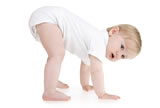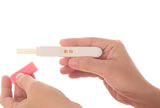What If My Baby is Super Sized? Macrosomia
| on 04th April 2013 |
What If My Baby is Super Sized?
Before you panic about the possibility of something being wrong with your new baby, macrosomia is just the proper medical word that means over-sized. This is how doctors classify newborns that exceed the average birth weight by quite a bit.

The average newborn weight worldwide is 7 lb. 8 oz. To be categorized as macrosomia, the baby must weigh greater than 8 lb. 13 oz. at birth. Approximately 9% of the babies born every year are considered macrosomic.
What Causes Macrosomia?
There are some things that are known to contribute to fetal macrosomia, but there are also many cases where it's unknown why a baby was larger than normal at birth. In fact, it's more likely for a mother of a macrosomic infant to have no known risk factors than it is for there to be an identifiable cause.
The most common factor that researchers have identified as a probable cause of macrosomia is diabetes. Whether the mother has type 1, type 2 or gestational diabetes, this condition leads to a higher likelihood of experiencing fetal macrosomia. This is especially true in the case of poorly managed diabetes, so that the mother experiences higher blood sugar levels than she should.
An overly long pregnancy that goes past the expected due date can also cause fetal macrosomia. Of course, this makes sense from the standpoint of knowing that the typical baby gains a lot of weight at the end of the pregnancy. A baby that would have been a normal weight at birth, could easily be classified as macrosomic when the birth date is delayed by two or three weeks.
In very rare cases, the baby could have a condition that makes them grow faster than normal. This is exceedingly uncommon, but is possible.
Risk Factors for Having an Extra Large Baby
While these things aren't causes of macrosomia, they are factors that are more common in women who have abnormally large infants:
-Hispanic women are far more likely to have a macrosomic baby than any other race.
-Boys are more likely to be over-sized than girls.
-If Mom or Dad was an enormous baby, then it's more likely your baby will be large, as well.
-Being overweight yourself increases the risks of having an overly big baby.
-If you've had macrosomic babies in the past, you're more likely to have another.
-Women over age 35 are at higher risk of having an extra large baby.
Even if you have none of these risk factors and don't have any type of blood sugar disorder, you can still have a baby with fetal macrosomia. Remember what we said in the last section, it's actually more likely that you will show no risk factors and yet still have an unexpectedly large baby.
Won't an Ultrasound Reveal Macrosomia?
Many people think that the ultrasound will reveal any problems such as an extra large baby, but that's usually not the case. While this technology can get a remarkably detailed picture of the unborn child, figuring the exact size and weight of the baby is impossible. By measuring various parts of the fetus in the picture, doctors can give a good rough estimate of weight, but it's frequently quite a big difference from the actual weight of the baby when it's born.
Excessive amniotic fluid, which shows somewhat in the ultrasound images, can indicate a larger than normal baby. The fluid surrounding your baby at the end of the pregnancy gets increased by the baby actually urinating, as the bodily systems get warmed up and practicing for life outside the womb. The bigger the baby, the more the urine it produces. Again, this is tricky to determine from the ultrasound images.
One other test can be done on the mother during a prenatal visit. This test is actually a measurement called the fundal height. The doctor will measure you from the top of the uterus to the pubic bone. If this is bigger than standard, it may indicate a baby that's larger than normal.
Dangers Macrosomia Creates for Mom During Delivery
The most dangerous complication that can be caused by delivering a macrosomic baby is excessive bleeding. This can come from the almost guaranteed perineal tearing, possible vaginal tissue tears, and the higher possibility of increased bleeding after the birth caused by uterine atony. About 15% of mothers who deliver a baby weighing more than 9 pounds will require a blood transfusion, compared to only just over 3% of mothers who deliver an average size infant.
Problems during labor are fairly typical when a mother tries to give birth to an abnormally large baby. The baby could become stuck if the bones and birth canal can't stretch enough. This is not only painful for the mother, but increases risks for the baby due to the measures that may have to be taken in order to get the child delivered.
Dangers of Macrosomia for Baby During Birth
In most cases, the dangers for the super sized baby are minimal. There may be some bruising or even skin tears due to the need for forceps or other assistive devices. These will heal with just a little time after birth.
One thing that can be more dangerous, but thankfully is quite rare, is the possibility of shoulder dystocia. This happens when the baby's shoulder gets trapped behind the mother's pelvic bone during delivery, right after the head comes out of the birth canal. The doctor will take action to free the infant and finish delivery, but this can sometimes result in a broken collarbone for the baby.
My Big Baby's Health After Birth?
In most cases, a macrosomic baby will do just fine after being born, with no residual ill effects. Occasionally, there could be some nerve damage, in the case of shoulder dystocia. This happens in up to 16% of babies with this condition, but almost all recover completely with treatment.
There is some research that indicates macrosomia is associated with a higher risk of obesity in childhood. Impaired glucose tolerance and metabolic syndrome are two other conditions that these babies may be more likely to experience during childhood.
Video Source: Youtube
Copyright © 2012 Babiesbase.and respective owners. All rights reserved.
Other product and company names shown may be trademarks of their respective owners.











 Sign up for our week by week
Sign up for our week by week

